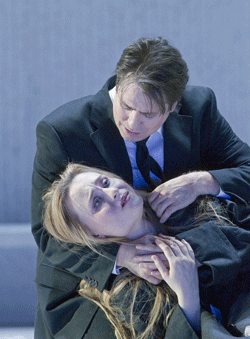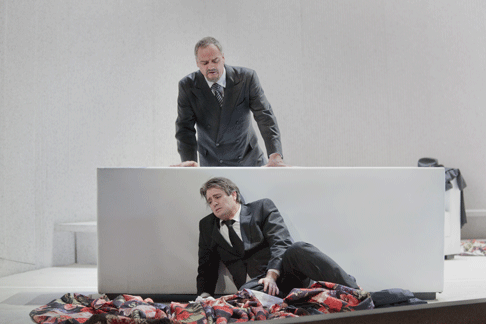But what about the individual institutions that make Lincoln
Center the landmark it is? How can we make them as welcoming?
On January 6, the Metropolitan Opera attracted a large and lively crowd for
the season’s final performance of its reduced version of Julie
Taymor’s production of The Magic Flute, sung in English. Despite
the family appeal, the adults in the audience still far outnumbered their
younger counterparts.
Unfortunately, there were moments of obvious disconnect between conductor
Erik Nielsen, the Met orchestra, and the singers. The evening got off to a
rough start due to the awkward excising of the overture and some rather
listless performances from Bruce Sledge as Tamino and Wendy Bryn Harmer, Jamie
Barton, and Tamara Mumford as the Three Ladies. Things didn’t pick up
until Nathan Gunn’s assured entrance as Papageno.
Susanna Phillips worked hard to make her Pamina three-dimensional and she
succeeded despite some bizarre staging and an inexplicable costume. Bass Morris
Robinson deserves kudos for his performance as Sarastro. He was one of only a
few artists who made the most of singing and speaking in the audience’s
vernacular. Ashley Emerson did an especially good job with her spoken scenes as
Papagena and brought real charm to the role.
There are several fun moments in this production but, on the whole, the
performance felt uncoordinated and severely lacking in the magic department. At
the curtain call, a man sitting behind me yelled “Bravo!” when a
cast member came onstage to take a bow, but then immediately turned to his
companion and said, “I don’t even remember that guy!” Yes,
that man in the audience can say he went to the opera and maybe he even enjoyed
the 140 minutes he spent there, but the nearly instantaneous amnesia he
experienced is not what opera is about. I began to wonder exactly how much
putting a friendlier face on Lincoln Center has cost, and not necessarily in
dollars.
 Marina Poplavskaya as Violetta and Mattew Polenzani as Alfredo
Marina Poplavskaya as Violetta and Mattew Polenzani as Alfredo
When the audience is packed with people young and old cheering in the aisles
has the battle for a more “inviting” Lincoln Center been won? Not
if they’re streaming out the doors before the prima donna has taken her
bow. Not if they forget about the opera they just saw before they even catch a
cab at that fancy new underpass.
If Thursday night’s performance was unmemorable, Friday night’s
showing of the Met’s newly acquired production of La Traviata
provided plenty to think about. German director Willy Decker has not only
stripped the drama to its essentials, he also effectively changed the
opera’s architecture by eliding the final three acts into a single
sequence. Strangely enough, this had less of an effect on the combined acts
than it had on Act I, which felt weakly related to the rest of the evening.
Still, the evening progressed seamlessly from the single intermission to the
end, the drama unfolding at a relentless pace that illustrated both
Violetta’s lifestyle and her illness.
Restructuring the opera in this manner created an added challenge for Marina
Poplavskaya in the title role. In the first act her defiant and flippant
Violetta spent practically the entire time posturing and posing. This could
have been dramatically effective if the singing had been tossed off with more
ease. As it was, both the acting and the singing felt effortful. Still, she met
the trials of the long second half and her performance of “Addio, del
passato” was genuinely touching.
As Alfredo, Matthew Polenzani sang with an appealing mix of passion and
elegance despite a few potentially awkward staging moments. Moreover, he was
the only cast member to comfortably fit Decker’s style within a greater
musical context. Playing the elder Germont, Andrzej Dobber sang and acted with
unusual brusqueness. Although a refreshing reminder of bourgeois prejudices,
this harshness should have been better tempered with more subtle compassion in
order to make his later actions logical and to soften his sound in places.
 Mattew Polenzani as Alfredo and Andrzej Dobber as Germont
Mattew Polenzani as Alfredo and Andrzej Dobber as Germont
Jennifer Holloway was a stylish and androgynous Flora but, because of her
costuming, she got lost in the crowd despite a fine performance. In the
dramatically expanded role of Dr. Grenville, Luigi Roni did an excellent job of
segueing between the part as originally written and functioning as an effective
personification of death. Among the comprimario parts, Maria Zifchak was
excellent and underused as Annina. Juhwan Lee and Joseph Turi both made strong
impressions as well.
As for the production itself, only time will tell if Decker’s version
can withstand the rotating casts and quickly changing tastes that burden a
repertory production of La Traviata. While the previous Met production
practically engulfed singers with its fussiness, Decker’s is brilliantly
and almost cruelly exposed. Furthermore, while the attractive set and nearly
uniform costumes feel both contemporary and timeless, they have a whitewashing
effect that the singers must fight against. A power couple such as Anna
Netrebko and Rolando Villazon may have done it with ease, but it is difficult
to imagine a pair of singers who could match their success. However, the
staging and design of Decker’s production (with sets and costume designs
by Wolfgang Gussmann) are intriguing and enjoyable. Like the renovations that
surround the opera house, I consider the Met’s new Traviata to
be a success.
Alison Moritz
Cast Lists:
W. A. Mozart: Magic Flute — Pamina: Susanna Phillips; Queen of the Night: Erika Miklosa; Tamino: Bruce
Sledge; Papageno: Nathan Gunn; Speaker: Tom Fox; Sarastro: Morris Robinson;
Papagena: Ashley Emerson; 1st Lady: Wendy Bryn Harmer; 2nd Lady: Jamie Barton;
3rd Lady: Tamara Mumford; Monostatos: Joel Sorensen. Conductor: Erik Nielsen.
Production: Julie Taymor. Set Designer: George Tsypin. Costume Designer: Julie
Taymor.
Giuseppe Verdi: La Traviata — Violetta: Marina Poplavskaya; Alfredo: Mattew Polenzani; Germont: Andrzej
Dobber; Flora: Jennifer Holloway; Annina: Maria Zifchak; Gastone: Scott Scully;
Dr. Grenvil: Luigi Roni; Giuseppe: Juhwan Lee; Messenger: Joseph Turi.
Conductor: Gianandrea Noseda. Production: Willy Decker.
![Marina Poplavskaya as Violetta [Photo by Ken Howard courtesy of Metropolitan Opera]](http://www.operatoday.com/_S1E2849a.gif)

